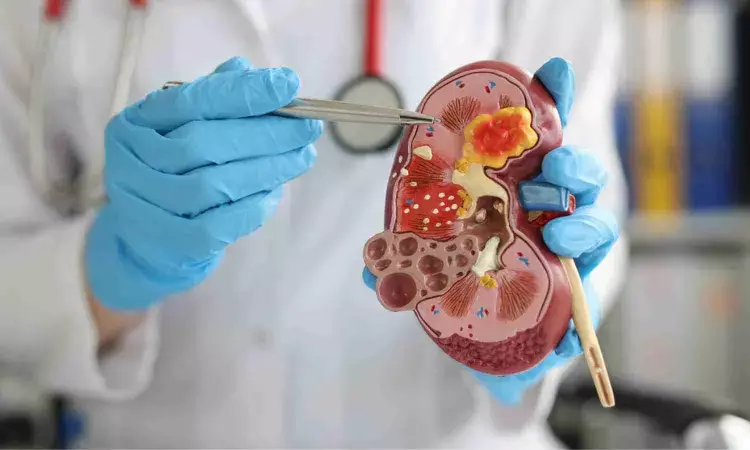- Home
- Medical news & Guidelines
- Anesthesiology
- Cardiology and CTVS
- Critical Care
- Dentistry
- Dermatology
- Diabetes and Endocrinology
- ENT
- Gastroenterology
- Medicine
- Nephrology
- Neurology
- Obstretics-Gynaecology
- Oncology
- Ophthalmology
- Orthopaedics
- Pediatrics-Neonatology
- Psychiatry
- Pulmonology
- Radiology
- Surgery
- Urology
- Laboratory Medicine
- Diet
- Nursing
- Paramedical
- Physiotherapy
- Health news
- Fact Check
- Bone Health Fact Check
- Brain Health Fact Check
- Cancer Related Fact Check
- Child Care Fact Check
- Dental and oral health fact check
- Diabetes and metabolic health fact check
- Diet and Nutrition Fact Check
- Eye and ENT Care Fact Check
- Fitness fact check
- Gut health fact check
- Heart health fact check
- Kidney health fact check
- Medical education fact check
- Men's health fact check
- Respiratory fact check
- Skin and hair care fact check
- Vaccine and Immunization fact check
- Women's health fact check
- AYUSH
- State News
- Andaman and Nicobar Islands
- Andhra Pradesh
- Arunachal Pradesh
- Assam
- Bihar
- Chandigarh
- Chattisgarh
- Dadra and Nagar Haveli
- Daman and Diu
- Delhi
- Goa
- Gujarat
- Haryana
- Himachal Pradesh
- Jammu & Kashmir
- Jharkhand
- Karnataka
- Kerala
- Ladakh
- Lakshadweep
- Madhya Pradesh
- Maharashtra
- Manipur
- Meghalaya
- Mizoram
- Nagaland
- Odisha
- Puducherry
- Punjab
- Rajasthan
- Sikkim
- Tamil Nadu
- Telangana
- Tripura
- Uttar Pradesh
- Uttrakhand
- West Bengal
- Medical Education
- Industry
Corticosteroids use reduces proteinuria but fails to delay ESKD in immunoglobulin A nephropathy: Study

Norway: In a cohort of Norwegian patients with immunoglobulin A nephropathy (IgAN), a recent retrospective cohort study showed no impact of corticosteroid therapy on progression to end-stage kidney disease (ESKD), although the therapy reduced proteinuria. Also, the treatment was associated with adverse effects.
"Corticosteroid therapy did not affect the time from diagnosis until end-stage kidney disease among a cohort of patients who all reached end-stage kidney disease," the researchers wrote in BMC Nephrology.
Multiple agents have been progressing through clinical programs for IgAN treatment, but only budesonide (Tarpeyo) has earned US Food and Drug Administration (FDA) approval thus far. The 2012 Kidney Disease Improving Global Outcomes guideline recommended long-term angiotensin-converting enzyme inhibitor or angiotensin II receptor inhibitor treatment for patients with immunoglobulin A nephropathy and proteinuria > 1 g/d, a threshold that was reduced eventually to 0.5 g/d in the 2021 guideline. However, the efficacy and safety of corticosteroids in this patient population have been debated widely.
Despite several clinical trials, the use of corticosteroid therapy for IgAN treatment remains controversial. While some studies have suggested that corticosteroids are linked with improved clinical outcomes, other studies have questioned the benefits of immunosuppression. Therefore, Thomas Knoop, Department of Medicine, Haukeland University Hospital, Bergen, Norway, and colleagues aimed to describe using corticosteroid therapy combined with supportive therapy in Norwegian patients with IgAN who had progressed to end-stage kidney disease.
For this purpose, they conducted a retrospective cohort study using Norwegian Renal Registry data. One hundred and forty-three patients with primary IgAN who progressed to end-stage kidney disease were categorized into two groups: the corticosteroid group, which had been treated with corticosteroids and supportive therapy, and the non-corticosteroid group, which had undergone only supportive therapy. Of the 143 included patients, 103 underwent supportive therapy alone, and 40 were treated with corticosteroids.
The time to end-stage kidney disease, kidney function, and adverse effects were described. The observation period lasted from the diagnostic kidney biopsy until the initiation of kidney replacement therapy.
The study led to the following findings:
- Most patients (94%) were treated with renin-angiotensin-system blockade, and all patients reached end-stage kidney disease after a median of 5 years.
- Time from diagnosis until end-stage kidney disease was similar in the two study groups.
- During six months of corticosteroid therapy, median eGFR declined from 21 mL/min/1.73 m2 to 20 mL/min/1.73 m2, and median proteinuria decreased from 5.5 g/24 h to 3.0 g/24 h.
- Most patients (87.5%) treated with corticosteroids reported adverse events.
- In the linear regression analysis investigating the time to ESKD, age (β = -0.079) and proteinuria at diagnosis (β = -0.50) exhibited statistically significant associations with a delay in the progression to ESKD.
"In this historical cohort of Norwegian patients with advanced and progressive immunoglobulin A nephropathy, corticosteroids decreased proteinuria but did not affect time from diagnosis until end-stage kidney disease among a cohort of patients who all reached ESKD," the researchers wrote. "Additionally, adverse effects were common in patients treated with corticosteroids."
Reference:
Rivedal, M., Haaskjold, Y.L., Eikrem, Ø. et al. Use of corticosteroids in Norwegian patients with immunoglobulin a nephropathy progressing to end-stage kidney disease: a retrospective cohort study. BMC Nephrol 25, 42 (2024). https://doi.org/10.1186/s12882-024-03481-6
Dr Kamal Kant Kohli-MBBS, DTCD- a chest specialist with more than 30 years of practice and a flair for writing clinical articles, Dr Kamal Kant Kohli joined Medical Dialogues as a Chief Editor of Medical News. Besides writing articles, as an editor, he proofreads and verifies all the medical content published on Medical Dialogues including those coming from journals, studies,medical conferences,guidelines etc. Email: drkohli@medicaldialogues.in. Contact no. 011-43720751


